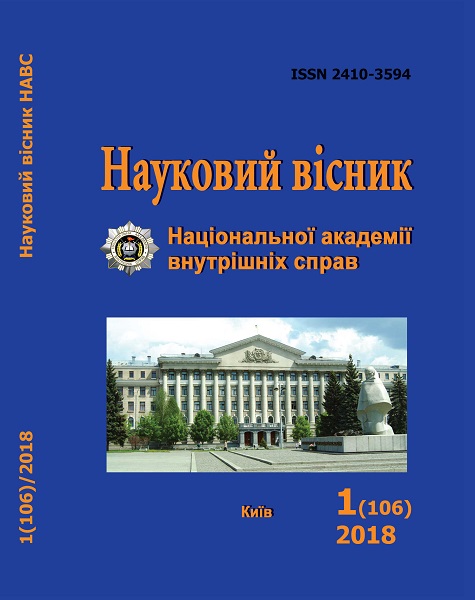The Peculiarities of Guilt’s Definition for Persons Involved in Terrorist Acts Commission
Abstract
The circumstances characterizing the person’s guilt and which are to be established in criminal proceedings on the fact of a terrorist act commission are disclosed in the article. It is determined that the main tasks during the investigation of a terrorist acts are the determination of guilt, motives and purpose of the criminals who committed them. The aggregate of such circumstances forms the subject of proving in a criminal proceeding, which is specified depending on the features of a particular crime taking into account Art. 91 of the Criminal Procedure Code of Ukraine.
The complexity of prosecution in the commission of crimes related to terrorist activities also is in the fact that the offender must be aware of unlawful character of one’s actions and he/she demonstrates the wish to commit it. Terrorist’s actions are always intentional, and careless guilt excludes the prosecution of such person. Therefore, the person committing a terrorist act realizes the level of social danger caused by such crime, provides an opportunity or inevitability of his/her actionsresulting in danger to life or health of a person or causing significant damage to social relations, etc., and admits it.
Clarification of the motive of criminal offense is one of the main tasks in criminal offense investigation, in particular participation in the terrorist act commission. Timely and accurate identification of the motive of terrorist act commission has an impact on the effectiveness of the investigation, as it promotes the establishment of a range of persons potentially involved in an unlawful act and to take all necessary measures for prosecution.
It is noted that any terrorist activity is carried out purposefully and always envisages the presence of a specific purpose. The formed «motive-purpose» vector is realized in the activity; completed activity (achieved purpose) creates the possibility of «transferring» this vector to a new level, etc. The motive and purpose of such crimes are closely interconnected. The peculiarity of terrorism is that the formation of purposes is largely unrelated to concrete manifestations of violence, that is, there is no direct connection between victims and the purpose pursued by terrorists.
Data on the motives and purpose of a terrorist act commission must be used in the issuance of investigative versions of the subject and the subjective part of the unlawful act, when organizing the search for the criminal, when choosing tactical techniques during certain investigative (search) actions, covert investigative (search) actions and operational-search activities.
Downloads
Abstract views: 105 PDF Downloads: 63
- Authors reserve the right to authorship of their own work and transfer to the magazine the right of the first publication of this work under the terms of the Creative Commons Attribution License, which allows other persons to freely distribute published work with mandatory reference to authors of the original work and the first publication of an article in this magazine.
- Authors have the right to enter into separate additional agreements on non-exclusive dissemination of the work in the form in which it was published in the journal (for example, to post an article in the institution's repository or to publish as part of a monograph), provided that the link to the first publication of the work in this journal is maintained.
- The journal's policy allows and encourages the posting of articles by authors on the Internet (for example, in electronic storehouses of institutions or on personal websites), both before the submission of this manuscript to the editorial office and during its editorial processing, as this contributes to the creation of a productive scientific discussion and positively affects the efficiency and dynamics of citing the published work.




